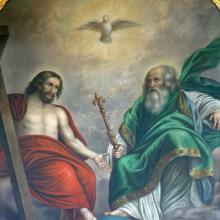church doctrine

Painting of Pope Francis by faithmouse / Flickr.com, http://www.flickr.com/photos/dan_lacey_pancakes/
Pope Francis quickly is establishing himself as the “peoples’ Pope.” He has actively advocated for the poor, downplayed his elevated status, and speaks in colloquial terms that make him seem that much more human. He has left open the possibility that non-Catholics, non-Christians, and even atheists may fall within the vast embrace of a radically loving and merciful God. And now, he’s even made what many consider at least a benign – if not affirming – statement about homosexuality.
Historically, popes have toed an ideological line, asserting that homosexuality is inherently evil, and that all gay people are fundamentally disordered. In an expression of sincere humility, political savvy, or perhaps some combination of both, Francis took a more compassionate position, adding at the end of his comments, "who am I to judge?"
Welcome to the 20th century, Catholic Church.
I have a confession to make.
A while back, I was applying for an editing job with a fairly prominent Christian media company, and in the application process, I was asked to sign a statement of faith. For those unfamiliar, this is a list of things that the organization in question claims to believe, and they ask all who are interested in being a part of it to sign their name, claiming their personal agreement with and belief in the exact same things.
Truth be told, I needed the job. So even though I didn’t actually agree with several points in the statement of faith, I signed it. Turns out I didn’t get the job anyway, so I compromised myself for pretty much nothing.
I had another organization approach me recently about publishing some of my work. They’ve followed my writing for some time and thought that my content would add something valuable to their community. In most cases, when I give permission to folks to “repost” my stuff, it involves little more than a verbal agreement about what they plan to do with my articles. But this one came with two separate agreements I was asked to sign before moving forward.
There, in the middle of both agreements, were the same statements of faith, nearly mirroring word-for-word the one I had disingenuously signed the first time when the job was at stake. But this time, I thought twice about it. I wrote them and explained that, although I’d be happy to work with them, I couldn’t sign their faith doctrine agreement in good conscience.
Holy Trinity is not the most popular festival among preachers who, for all the other seasons and special days of the church year, normally get to dig into interesting gospel narratives.
Most other festivals of the church celebrate an event. We commemorate happenings in the life of Christ: Mary’s visit from Gabriel announcing the miraculous child she was to bear into the world, God’s own word made flesh. We celebrate also the light bearing nature of your own patronal season of Epiphany, we celebrate the messy Baptism of our Lord, the confusing Transfiguration, and Jesus riding triumphant into Jerusalem amidst palms and cheers. We celebrate the empty tomb of Easter, the glorious Ascension, the chaotic coming of God’s spirit to the church at Pentecost all leading up to today, when we celebrate … a church doctrine.
Preachers dread this day because we see it as kind of a dry dusty theological topic after such the exciting and earthy part of the liturgical year that came before it. It’s like there’s this raucous party of Easter and Pentecost that comes to a screeching halt while an old crotchety man shuffles up to the pulpit, blows the dust off an enormous leather-bound book, clears his throat saying And now a celebration of church doctrine causing the music to fade, the last of the Pentecost streamers still floating to the ground. Church doctrine Sunday.

